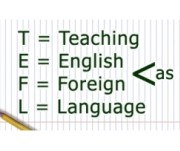What kind of people teach EFL?
The reasons why and when people choose to teach EFL can be loosely categorised, but not really the people themselves. They come from far and wide, from a variety of age groups and from a huge assortment of professional and academic backgrounds.
Perhaps this is due to the fact that every native, or near native, English speaker possesses a proficiency in the main skill that needs to be imparted – English. Granted, this doesn’t mean that everyone will be a great teacher, but the basic skill that they will be required to teach is there, and the rest can be improved.
There are lots of reasons why people choose to teach EFL, but there tend to be four main groups of people: people taking a gap year, people taking a career break, people who want a retirement or second career option and people who want a full-blown career in TEFL.
A gap year activity
So-called ‘gappers’ tend to be in the 18-25 bracket, and are normally taking a year out just before or after they have finished their studies. Sometimes the main impetus for them to train in TEFL is so that they can spend a year abroad in a specific country in order to hone or learn foreign language skills. For others, it is simply a way for them to see new parts of the world and learn more about different cultures. Other gap year TEFLers may be teaching as part of wider volunteering type-projects, normally in developing countries around the world. TEFL can certainly be a ‘worthwhile’ project to undertake in this type of year off from work or study, and skills that are learnt through teaching will be a welcome addition to the CV of anyone trying to get onto the career ladder.
A career break option
Teaching TEFL as part of a career break is similar to teaching on a gap year in terms of its length and appeal -many people who take gap years or careers breaks have the same reasons for wanting to do so and are only looking to be away for a year or two at the most. Career breakers tend normally to be a little older – between 25 and 35 in general. Although sometimes both career breakers and ‘gappers’ train in TEFL with a specific goal in mind – to find a job in a certain area of the world and stay there for a set amount of time – others train in TEFL more as a ‘back up’ option. There is usually casual work available on the travelling route, and having a TEFL certificate in your back pocket will certainly come in handy if you come across informal teaching work and want to top up your funds along the way.
A second career, or retirement project
It’s interesting to note that one of the first questions asked by the majority of potential TEFL course applicants over the age of 45 is ‘am i too old’? This must mean, I suppose, that TEFL is still largely associated with this kind of gap-year/career break travel. The answer to the question of course though, is no. Trends over the last 10 years or so (admittedly before the recession struck) have been that people retire from their main profession earlier, and consider relocating to the likes of France and Spain to enjoy their retirement in warmer climates. Both of this things have encouraged far more people within this stage of life to consider TEFL, either as a way to ‘give something back’ via voluntary work in the UK, to make a bit of extra money via private tutoring, or for those who relocate abroad, as a way to integrate into the local community.
A long-term career
Often people who start off teaching TEFL as a gap year or career break option enjoy it so much that they end up making a career out of it. Other people, although less abundant in number, know right from the start that TEFL is the career path they want to follow and train for this accordingly. They may also choose to study for an MA in TESOL. It could be that they have permanent plans to relocate to a country and set up a school, or simply that they want to remain in the UK and teach or train within language schools, or the lifelong learning sector.
In short, there really is no one type of person who teaches TEFL, and one reason for why people choose to do so. The industry comprises a mix of short-term teachers and long-term teachers, those who are doing it for money and those who teach on a voluntary basis, those who teach in the UK and those who teach abroad. The good thing about TEFL is that there are opportunities and suitable courses for everyone, irrespective of what capacity they hope to teach in.










Leave a Reply
Want to join the discussion?Feel free to contribute!